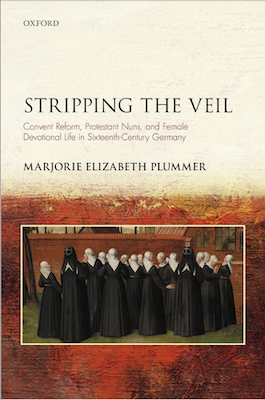2022 Hans Rosenberg Book Prize
The Central European History Society is proud to announce the winner of the Hans Rosenberg Book Prize, awarded to the best book in the field published by a North American scholar in 2022.
Marjorie Elizabeth Plummer, Stripping the Veil: Convent Reform, Protestant Nuns, and Female Devotional Life in Sixteenth-Century Germany (Oxford University Press, 2022)

Rarely does a book so thoroughly call into question such a basic assumption that most historians of early modern and modern Europe employ as does Marjorie Elizabeth Plummer’s recent work. In this ambitious, wide-ranging, well written and insightful study, Plummer explores the long-term survival of convent congregations in Protestant regions of the Holy Roman Empire, details the daily life of Protestant (or as Plummer calls them, “evangelical”) nuns in convents, and studies the emergence of mixed-confessional convents and religious practices in early modern German communities. Through a wide variety of carefully chosen examples, she illustrates the highly fluid and mixed hybrid identities within these spaces, highlighting the complexity of female devotional life and practice in the sixteenth- century German lands. Along the way, Plummer also reckons with the striking absence of these spaces (and the phenomenon of “evangelical nuns” more generally) from standard accounts of the history of the Reformation that continue to define many of the period’s convent congregations along strictly confessional lines.
Protestant preachers and reformers often railed publicly and in print against what they saw as the evils of monastic life, comparing convents, in particular, to brothels. During the Peasants’ War, these words frequently led to physical violence, with laymen storming convents and sometimes violently dragging nuns out of their religious institutions. Given these verbal and violent assaults, it is stunning to learn that hundreds of functioning convents still existed in Protestant territories at the close of the sixteenth century. Plummer expertly shows that local authorities, disturbed by these outbreaks of violence against cloistered women, created conditions in which convents could survive in these territories; just as importantly, she also documents the very real agency that nuns had in the development of these spaces and their own lives. While each convent was different and faced its own constellation of local power politics and financial considerations, nuns often accepted just enough of the reforms that were forced on them by rulers and religious authorities to ensure their survival. Sometimes that meant Catholic elements—whether individual devotional practices or far more visible markers such as entire convents with their own property—continued long after towns became nominally Protestant.
Truly remarkable is the amount of research Plummer includes in her book. In total, her findings rest upon cases drawn from an astounding forty-nine archives from places as diverse as Augsburg, Dresden, and Strasbourg. While each case had a logic and trajectory of its own, Plummer provides such extensive and detailed evidence from multiple convents (a total of 175), including Engelthal (near Nuremberg), Sitzenroda (near Leipzig), and Barsinghausen (near Hanover), that her larger point of incremental change, fluidity, and notable agency exercised by some women religious vis-à-vis secular authorities is largely indisputable. The extent of the material she has consulted makes the readability of the book even more impressive. Her study creates a powerful new way to look more closely than ever before possible at how religious reform initiatives actually played out in practice, allowing readers to access in a totally new (and nuanced) way their dynamism, pluralism and volatility. Plummer brings into full relief the lived reality of negotiation and compromise, which in many cases resulted in the “undefined, hybrid and mixed-confessional convent congregations” that are at the very heart of her study. It is a wonderful book that will continue to shape how historians think about the nature, pace, and extent of religious change in Reformation Europe, at the level of politics and everyday life, for many years to come.
The 2022 Hans Rosenberg Book Prize committee:
Kelly Whitmer, Chair
Rebecca Bennette
Christopher Molnar